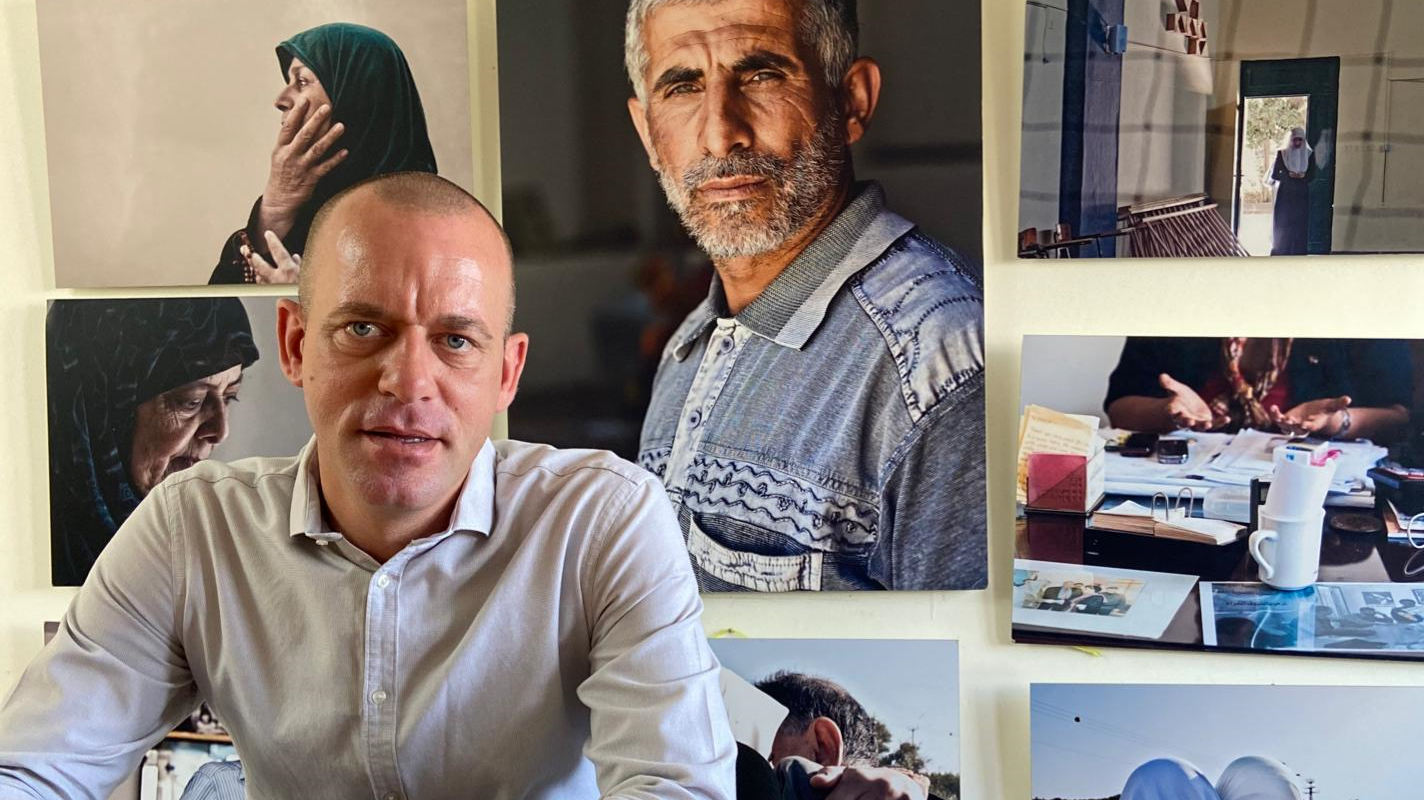The Israeli occupation is set to deport Palestinian-French human rights defender Salah Hammouri to France on December 4. The 37-year-old lawyer, who has been under illegal administrative detention since March, was notified of the decision on Wednesday, November 30.
Hammouri is a researcher at the Palestinian prisoner advocacy group Addameer, one of six Palestinian civil society organizations outlawed by Israel. He has faced increasingly severe violence and harassment at the hands of the occupation for two decades, since his first arrest in 2001 during the second Intifada at the age of just 16.
Hammouri has spent nearly a decade in Israeli prisons, often without charge or trial. On March 7, 2022, Israeli Occupation Forces, accompanied by the notorious undercover Musta’ribeen unit, stormed Hammouri’s house in Kufor Aqab, north of Jerusalem. He was placed under arrest and his electronic devices, including cell phones and a laptop, were seized.
On March 13, he was placed under administrative detention for three months. Hours before his scheduled release in June, Hammouri was informed that his detention had been renewed. In August, the Ofer military court denied his appeal against the detention order based on evidence from “secret files,” citing his supposed affiliation with the Popular Front for the Liberation of Palestine (PFLP).
Hammouri’s detention was renewed yet again on September 4 for a period of three months, which will now end with his deportation.
Israel has deployed its illegal and arbitrary policy of administrative detention almost exclusively against Palestinians to imprison them indefinitely, while denying them the basics of due process and the rights enshrined under international law. According to Addameer, 820 people are being held as administrative detainees in Israeli prisons at present.
What has been of particular note in Hammouri’s case is Israel’s consistent attempt to permanently expel him from Jerusalem.
In 2005, Hammouri was arrested and imprisoned for allegedly plotting an attack on an Israeli Rabbi, Ovadia Yosef. Following negotiations with the French consulate, he was offered a deal—to leave Jerusalem for France for 10 years in exchange for his release. Hammouri rejected the allegations and refused the offer, and was sentenced to seven years in prison.
In 2015, he was barred from entering the occupied West Bank from his home in Jerusalem for six months. The order was subsequently renewed before being removed in 2016. Hammouri was placed under administrative detention again in August 2017, to be released only in September 2018 after an extension and a renewal.
On September 3, 2020, Israeli authorities informed Hammouri of their decision to revoke his permanent residency status, citing a “breach of allegiance” to the State of Israel. He was officially notified of the revocation in October, 2021.
Earlier this morning, Salah Hammouri, 36y/o Palestinian-French HRD, lawyer at Addameer & former prisoner, was officially notified of the Israeli Minister of Interior's decision to revoke his permanent residency based on "breach of allegiance."
1/4 pic.twitter.com/DvDgwCs3lF— Addameer –الضمير (@Addameer) October 18, 2021
Residency revocation has been a key tool of the Israeli settler-colonial project, used against Palestinians in occupied East Jerusalem since its illegal annexation in 1967. Israel created the status of “permanent residents” for Palestinians in Jerusalem, a deliberately precarious identity subject to control and manipulation by the occupation.
The criteria for revocation have been expanded over the years to strip over 14,500 Palestinians of their residency rights. Residency revocation is often accompanied by Israel’s other policies of ethnic cleansing geared towards illegally creating and maintaining an Israeli-Jewish majority in the occupied territory.
In 2018, Israel amended its Entry to Israel Law allowing its Interior Ministry to revoke the residency status of Palestinians deemed to have “breached allegiance” to Israel.
“How can a brutally subjugated and colonized population be expected to pledge loyalty to its occupier?” Hammouri wrote in 2020.
Forced transfers emerging out of residency revocation, constitute a war crime and a violation of the Geneva Convention, which prohibits the forcible transfers of a protected population out of an occupied territory.
Israel has also repeatedly targeted Hammouri’s family, denying a family reunification application to permit him and his wife Elsa Lefort, a French citizen, to live together in Jerusalem. Lefort was ultimately deported to France, where she and their two children have been forced to remain.
Hammouri has continued to participate in collective resistance actions organized by Palestinian prisoners against their unjust incarceration, including the comprehensive boycott of the illegitimate military court system earlier this year, as well as a collective hunger strike launched in September.
In July, Hammouri penned an open letter to French president Emmanuel Macron, denouncing the “impunity” with which Macron allowed Israel to operate. He also criticized the manner in which Israel was treated as being “above the law” despite its ethnic cleansing of the Palestinian people.
A week later, Hammouri was reclassified as a “sagav”—or dangerous—prisoner, and, a few days later, transferred from the Ofer military prison to the high-security Hadarim prison. Israel took further punitive steps against Hammouri during the hunger strike in September, shifting him to solitary confinement in a windowless 2×2 meter cell, cut off from the outside world for a period of 15 days.
His case has drawn international attention, with independent UN experts denouncing Israel’s practices as not just unlawful, but “sadistic.” With his illegal expulsion now imminent, Palestinian activists and organizations have joined their voices with the Justice for Salah campaign to amplify the call for his release.
🚨 Alarmed by the imminent forcible deportation of Salah Hammouri, who is currently under detention w/o charge or charge!@EmmanuelMacron @MinColonna Do not be part of the ethnic cleansing of Palestinians from Jerusalem! Stop the forced deportation of Salah taking place Sun 4.12 https://t.co/VWSFvHDgeV
— Addameer –الضمير (@Addameer) November 30, 2022





